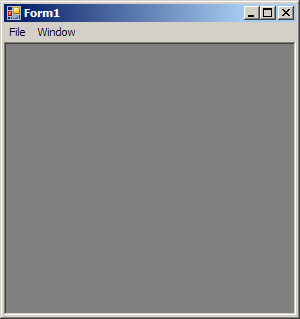
Imports System.Drawing
Imports System.Drawing.Drawing2D
Imports System.Windows.Forms
public class OpenChildrenFormInMenuAction
public Shared Sub Main
Application.Run(New Form1)
End Sub
End class
Public Class Form1
Inherits System.Windows.Forms.Form
#Region " Windows Form Designer generated code "
Public Sub New()
MyBase.New()
'This call is required by the Windows Form Designer.
InitializeComponent()
'Add any initialization after the InitializeComponent() call
End Sub
'Form overrides dispose to clean up the component list.
Protected Overloads Overrides Sub Dispose(ByVal disposing As Boolean)
If disposing Then
If Not (components Is Nothing) Then
components.Dispose()
End If
End If
MyBase.Dispose(disposing)
End Sub
'Required by the Windows Form Designer
Private components As System.ComponentModel.IContainer
'NOTE: The following procedure is required by the Windows Form Designer
'It can be modified using the Windows Form Designer.
'Do not modify it using the code editor.
Friend WithEvents MainMenu1 As System.Windows.Forms.MainMenu
Friend WithEvents MenuItem1 As System.Windows.Forms.MenuItem
Friend WithEvents MenuItem2 As System.Windows.Forms.MenuItem
Friend WithEvents MenuItem3 As System.Windows.Forms.MenuItem
<System.Diagnostics.DebuggerStepThrough()> Private Sub InitializeComponent()
Me.MainMenu1 = New System.Windows.Forms.MainMenu
Me.MenuItem1 = New System.Windows.Forms.MenuItem
Me.MenuItem2 = New System.Windows.Forms.MenuItem
Me.MenuItem3 = New System.Windows.Forms.MenuItem
'
'MainMenu1
'
Me.MainMenu1.MenuItems.AddRange(New System.Windows.Forms.MenuItem() {Me.MenuItem1, Me.MenuItem3})
'
'MenuItem1
'
Me.MenuItem1.Index = 0
Me.MenuItem1.MenuItems.AddRange(New System.Windows.Forms.MenuItem() {Me.MenuItem2})
Me.MenuItem1.Text = "File"
'
'MenuItem2
'
Me.MenuItem2.Index = 0
Me.MenuItem2.Text = "New..."
'
'MenuItem3
'
Me.MenuItem3.Index = 1
Me.MenuItem3.MdiList = True
Me.MenuItem3.Text = "Window"
'
'Form1
'
Me.AutoScaleBaseSize = New System.Drawing.Size(5, 13)
Me.ClientSize = New System.Drawing.Size(292, 273)
Me.IsMdiContainer = True
Me.Menu = Me.MainMenu1
Me.Name = "Form1"
Me.Text = "Form1"
End Sub
#End Region
Dim frmForm As Form2
Private Sub MenuItem2_Click(ByVal sender As System.Object, ByVal e As System.EventArgs) Handles MenuItem2.Click
frmForm = New Form2
frmForm.Text = "New Document"
frmForm.MdiParent = Me
frmForm.Show()
End Sub
End Class
Public Class Form2
Inherits System.Windows.Forms.Form
#Region " Windows Form Designer generated code "
Public Sub New()
MyBase.New()
'This call is required by the Windows Form Designer.
InitializeComponent()
'Add any initialization after the InitializeComponent() call
End Sub
'Form overrides dispose to clean up the component list.
Protected Overloads Overrides Sub Dispose(ByVal disposing As Boolean)
If disposing Then
If Not (components Is Nothing) Then
components.Dispose()
End If
End If
MyBase.Dispose(disposing)
End Sub
'Required by the Windows Form Designer
Private components As System.ComponentModel.IContainer
'NOTE: The following procedure is required by the Windows Form Designer
'It can be modified using the Windows Form Designer.
'Do not modify it using the code editor.
Friend WithEvents TextBox1 As System.Windows.Forms.TextBox
Friend WithEvents MainMenu1 As System.Windows.Forms.MainMenu
Friend WithEvents MenuItem1 As System.Windows.Forms.MenuItem
Friend WithEvents MenuItem2 As System.Windows.Forms.MenuItem
<System.Diagnostics.DebuggerStepThrough()> Private Sub InitializeComponent()
Me.TextBox1 = New System.Windows.Forms.TextBox
Me.MainMenu1 = New System.Windows.Forms.MainMenu
Me.MenuItem1 = New System.Windows.Forms.MenuItem
Me.MenuItem2 = New System.Windows.Forms.MenuItem
Me.SuspendLayout()
'
'TextBox1
'
Me.TextBox1.Dock = System.Windows.Forms.DockStyle.Fill
Me.TextBox1.Location = New System.Drawing.Point(0, 0)
Me.TextBox1.Multiline = True
Me.TextBox1.Name = "TextBox1"
Me.TextBox1.Size = New System.Drawing.Size(184, 149)
Me.TextBox1.TabIndex = 0
Me.TextBox1.Text = ""
'
'MainMenu1
'
Me.MainMenu1.MenuItems.AddRange(New System.Windows.Forms.MenuItem() {Me.MenuItem1})
'
'MenuItem1
'
Me.MenuItem1.Index = 0
Me.MenuItem1.MenuItems.AddRange(New System.Windows.Forms.MenuItem() {Me.MenuItem2})
Me.MenuItem1.Text = "Edit"
'
'MenuItem2
'
Me.MenuItem2.Index = 0
Me.MenuItem2.Text = "Auto Format"
'
'Form2
'
Me.AutoScaleBaseSize = New System.Drawing.Size(5, 13)
Me.ClientSize = New System.Drawing.Size(184, 149)
Me.Controls.Add(Me.TextBox1)
Me.Menu = Me.MainMenu1
Me.Name = "Form2"
Me.Text = "Form2"
Me.ResumeLayout(False)
End Sub
#End Region
End Class